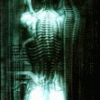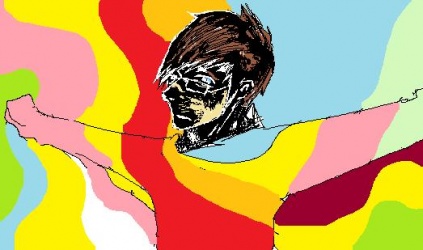Καλωσήλθατε στο .aNiMe//GR!
Αν συναντήσετε οποιοδήποτε πρόβλημα κατά την εγγραφή σας ή με την πρόσβαση σας στο forum, παρακαλούμε μην διστάσετε να επικοινωνήσετε μαζί μας.

Υπαρχει θεος ;
#496

Posted 12 April 2008 - 21:46
#497

Posted 14 April 2008 - 12:57
Ο Σπόνης αρχίζει να τα παίρνει... αλλά τους συγχωρεί αρκεί να μην επαναληφθεί...
#498

Posted 14 April 2008 - 14:19
Ο Θεός δημιούργησε το σύμπαν (αλλά κακώς λέμε "Ο" γιατί δεν έχει φύλο) αλλά δεν ξέρουμε τι είναι. Ούτε "ο" Θεός, ούτε το σύμπαν. Αν μπορώ να πιστέψω σε ένα Θεό "Πατέρα" μπορώ εξ ίσου εύκολα να πιστέψω και σε μια Θεό (Θεά) Μητέρα.
Aμφιβάλλω πολύ αν τα διάφορα "ιερά" (και βολικά λογοκριμένα) βιβλία είναι "θεόπνευστα", και τα διάφορα μεταγενέστερα κείμενα οπωσδήποτε ΔΕΝ είναι θεόπνευστα. (Δεν ήξερα πως ήταν θεόπνευστη η γνώμη κάποιου "πατέρα" πως οι γυναίκες δεν έχουν ψυχή, ή αν έχουν είναι κατειλλημένη από το "διάβολο").
Οι θρησκείες είναι καθαρά "ανθρωπόπνευστες" και ιδανικά δεν είναι τίποτα πέρα από "μονοπάτια" που ίσως μας κάνουν να πλησιάσουμε το "θείο" (όχι το θείο Σκρουτζ, το "Θεό".)
Οι εκκλησίες ήταν σχεδόν πάντα, και είναι και σήμερα, ένα εντελώς ανθρώπινο και ιεραρχικό κατασκεύασμα που ίσως στην αρχή είχε κάποια πνευματικότητα. Σήμερα δεν είναι παρά τρόποι εξουσίας και δύναμης πάνω στους ανθρώπους. Και αναφέρομαι σε όλες τις εκκλησίες των Μονοθειστικών θρησκειών, χριστιανικές και μη.
Εdit: Και για να μη γίνομαι εντελώς κακός, υπάρχουν "μέρη" διαφόρων εκκλησιών τα οποία δεν ομφαλοσκοπούν αλλά κάνουν ένα ανθρωπιστικό έργο. Αυτό το εκτιμώ και αυτούς τους ανθρώπους, άντρες και γυναίκες, τους εκτιμώ επίσης και πιστεύω πως είναι "πνευματικοί" άνθρωποι.
Αιρέσεις δεν υπάρχουν. Όλες οι αποχρώσεις θρησκειών, συμπεριλαμβανομένης και της "ορθοδοξίας" είναι "αιρετικές" (αίρεση = επιλογή). Αρρωστημένες σέχτες όμως (όπως διάφορες που υπόσχονται μετά την αυτοκτονία την αιώνια ζωή, αφού πρώτα οι πιστοί δώσουν την περιουσία τους στη σέχτα) υπάρχουν, αλλά δεν είναι "αιρέσεις". Είναι κοινωνικά άρρωστες ομάδες.
Ο Χριστός ήταν ένας σοφός, ίσως και "υιός του Θεού" αλλά οι χριστιανικές εκκλησίες δημιουργήσαν μια θρησκεία γύρω από το πρόσωπο του Χριστού και όχι γύρω από αυτά που είπε, δηλαδή αυτά που προσπάθησε να διδάξει.
Το θέμα της "θρησκείας" και της "πνευματικότητας" είναι καθαρά προσωπικό του καθενός και ουδείς έχει το δικαίωμα να επιβάλλει οτιδήποτε σε οποιονδήποτε άλλο. Κάθε χριστιανός έχει δικαίωμα να είναι χριστιανός, κάθε παγανιστής έχει δικαίωμα να είναι παγανιστής, κάθε Ιουδαίος, κάθε Ισλαμιστής. κάθε Βουδιστής κλπ. (Συμπεριλαμβάνονται και οι αγνωστικιστές και άθρησκοι σ'αυτό).
Οι "ακραίοι" όλων των θρησκειών, τιτλούχοι και "πιστοί" χρειάζονται ψυχίατρο και σεξ.
Όσο για τη δική μου "θρησκεία?" Star Trek RULEZ!!
#499

Posted 14 April 2008 - 21:03
ετσι μπραβο,πες τα !!!!
#500

Posted 15 April 2008 - 15:57
γενικα ομως πανω στν παλαια και καινη διαθηκη υπαρχουν κενα....τα οποια ειναι γνωστα και απλα δν τα δημοσιοποιουν...το γνωστο πλεον βιβλιο του ιουδα ποτε δν διμοσιευτηκε ποτε δν αναγνστηκε περα απο εμπιστα ατομα...παντα και παντου θα υπαρχει πολιτικο συμφερον σε τετοια θεματα και η ιστορια δν θα ξετυλιχτει ποτε
imo βεβαια,θεος δν υπαρχει και δν υφισταται...ειναι περισοτερο ενα συναισθημα θεοποιημενο...γιαυτο δν θεςρειται υπαρχτο...το ποιοσ και τι δημιουργησε το συβαν κτλ...δεστε και λιγο τν σελιδα του cern...εξηγει αρκετα..αλλα οχι ολα...και για το γαμωτο μπορω να δηλωσω πως θεοσ ειναι απλα μια τρομοκρατικη προπαγανδα για να μπορεσουν οι ανθρωποι να γνωριζουν οτι καποιος τους παρακολουθει,πρεπει να τον σεβεται και να τρεχουν στν θεια ανυπαρκτη αγκαλια του σε καθε ειδους προβλημα...
οπως εχω ξαναπει...ο φοβος ειναι ο ποιοτικοτερος καμβας της ζωης...αλλα καλο θα ητο
...πιστεβε και μη,ερευνα
2ον)οπως ελεγε στην παλαια διαθηκη ο πρωτοτοκοσ αδαμ και το πλευρο του αδαμ ι εβα ειναι οι πρωτοτοκοι...δν θαρρω πως ειναι πρεπεον για το ανθρωπινο ειδος να θεωρουνται οι κατεργαριδες..βεβαια ειναι μια ιστορια...αλλοστε ολοι γνωριζουμε τν επιστιμονικη αποψη....οχι βεβαια πως υπαρχει πρακτικη σε αυτον....
το θειο το προσδιοριζω εγω αλλιως...ο καθε ενας κρυβει το δικο του θειο οργανο...ολοι μαζι αποτελουμε εναν θεο...φανταστειτε 3 δις ατομα τη δυναμη πνευματικη και φυσικη θα χανουν...οταν ολοι γινει ενας και οχοι ο ενας ολοι...τες πα εχω πολλα ακομα να γραψω αλλα θα βαριεσται να διαβαζετε οποτε QQ:drink:

πραγματικα θελω να ψοφησω
#501

Posted 15 April 2008 - 21:45
Ο Ιησούς δε νομίζω να είναι "παραμυθάκι", εξ άλλου υπάρχουν πολλές μαρτυρίες πως ένα τέτοιο άτομο υπήρξε. Το "κακό" είναι πως ο ίδιος δεν άφησε τίποτα γραπτό και όλα περί της ζωής του γράφτηκαν πολλά χρόνια αργότερα από τους αποστόλους του, και μερικά λογοκρίθηκαν πιο μετά όταν τελικά η Αγία Γραφή πήρε τη μορφή που ξέρουμε.
Οι ιστορίες περί Αδάμ και Εύας θεωρούνται σήμερα - από τους περισσότερους - μάλλον συμβολικές και εξ άλλου είναι ιστορικά αποδεδειγμένο πως η Παλαιά Διαθήκη γράφτηκε σε μια μεγάλη χρονική περίοδο και όχι "μονοκοπανιά".
Υπάρχουν ασάφειες και αντιφάσεις βέβαια ουκ ολίγες. Όπως π.χ. το αναπάντητο ερώτημα "Πώς ο Κάιν παντρεύτηκε γυναίκα από τη χώρα Νοδ και έκανε απογόνους, αφού υποτίθεται πως δεν υπήρχαν άλλοι άνθρωποι ακόμα?"
Βέβαια η λέξη Νοδ σημαίνει "περιπλανούμαι" και ίσως χρησιμοποιήθηκε για να συμβολίσει την περιπλάνηση του Κάιν όταν εκδιώχτηκε και την περιπατητική ζωή των νομάδων "απογόνων" του.
Αλλά αν αυτό είναι συμβολικό, γιατί θέματα όπως π.χ. το "προπατορικό αμάρτημα" που μας έχει *******, και η σχετική ενοχή, δεν είναι συμβολικά?
Είναι πολλές τέτοιες ερωτήσεις που προσωπικά με κάνουν να βλέπω τις θρησκείες με μάλλον κριτικό μάτι και τις εκκλησίες με ακόμα πιο κριτικό!
Όσο για το τριαδικό δόγμα, προφανώς οι άνθρωποι έχουν ανάγκη από σχετικά γνωστές τους ιδέες, εικόνες και ρόλους ώστε να κάνουν έναν υπερβατικό Θεό λίγο πιο κατανοητό για τους ίδιους, και ένας Θεός-Πατέρας, ένας Θεός-Υιός και ένας Θεός-Άγιο Πνεύμα εκφράζουν αυτή την ανθρώπινη ανάγκη (για τους χριστιανούς μόνο)μαζί με όλη τη συμβολική της.
Αλλά χμμ (και ελπίζω να μην με αφορίσει κανείς)...γιατί όχι *και* Μητέρα, Κόρη και Άγιο Πνεύμα? (Δεν έχω ξαναπεί πιο αιρετικό πράγμα στη ζωή μου, με μόνη εξαίρεση οτι δεν ανήκω στους οπαδούς καμμιας ποδοσφαιρικής ομάδας πράγμα αρκετό για να αφοριστώ βέβαια).
Θα μπορούσε κάποιος να σκεφτεί πως η Μητέρα και η Κόρη έχουν άλλους ρόλους από τον Πατέρα και τον Υιό, και θα συμφωνούσα απόλυτα ΑΝ ζούσαμε ακόμα σε αρχαίες εποχές. Έτσι ήταν οι κοινωνίες τότε.
Όμως ο Θεός που είναι εκτός χρόνου, ανώτατο ον, χωρίς φύλο γιατί να μην έχει και συμβολική σημασία Μητέρας-Κόρης-Αγίου Πνεύματος?
Εκτός αν ο Θεός θεωρεί τις γυναίκες ικανές μόνο για ορισμένους ρόλους, όπως π.χ. να γεννούν τον Υιό.
Αν ισχύει αυτό, τότε δεν είναι να απορεί κανεις γιατί τόσες γυναίκες στρέφονται προς πιο "earth based" (παγανιστικές, ντε) θρησκείες όπου η "Θεά" έχει πρωτεύοντα ρόλο, ίσο συνήθως με το Θεό.
Άλλοι άνθρωποι πάλι προτιμούν την ιδέα "Father/Mother God"...
btw, στο πολλ ψήφισα "ναι". Πιστεύω σε ένα Ανώτατο Ον που στα Ελληνικά λέγεται "Θεός". Το γιατί δεν το ξέρω. Απλά πιστεύω...
#502

Posted 15 April 2008 - 22:01
Αρκετά καλό παράδειγμα για τα λόγια του Dain από πάνω μου.
Είναι γεγονός ότι
αλλά φυσικά αυτό συμβαίνει κατά κόρον σε Αμερικάνες Χώρες (δεν εννοώ μόνο τις Η.Π.Α)τόσες γυναίκες στρέφονται προς πιο "earth based" (παγανιστικές, ντε) θρησκείες όπου η "Θεά" έχει πρωτεύοντα ρόλο, ίσο συνήθως με το Θεό.
#503

Posted 15 April 2008 - 22:08
Έχω γνωρίσει γυναίκες πολλών ηλικιών που θα ταίριαζαν σε κάθε μία από τις "κατηγορίες" που αναφέρω.
Δηλαδή τελικά δεν ξέρω αν το όλο ζήτημα είναι η πίστη σε ένα Θεικό Ον (έστω και σε πολλά τέτοια όντα-πλευρές του Ενός), ή η αντικατάσταση μιας απαράδεκτης, ιεραρχικής πατριαρχίας με μια εξ ίσου απαράδεκτη και ιεραρχική μητριαρχία.
Ούτε το ένα ούτε το άλλο μου φαίνονται ιδιαίτερα "πνευματικά" ούτε και "εξυψώνουν" τον άνθρωπο προς ένα ανώτερο πνευματικό ιδανικό όπως ο/η Θεός.
#505

Posted 15 April 2008 - 23:06
Και δε μιλάμε για το χριστιανισμό αλλά για το Θεό και αν και πώς πιστεύουμε ή δεν πιστεύουμε. Αναγκαστικά θα αναφερθεί και ο χριστιανισμός.
#506

Posted 16 April 2008 - 00:35
ολοι μιλανε για τν ιδιο "Ιεχωβα" απλα με διαφορετικο ονομα....και φυσικα διαφορετικο τροπο λατρειας...
και θα παρακαλουσα τους χρηστες του στυλ...αμα θελετε να μιλησετε για θρησκεια μιληστε εδω....η του στυλ..ελα μωρε εγω δν πιστευς και ο μονος θεος ειναι οι MCR και αλλου τυπου τετοια τυπακια που το παιζουν μεγαλοι και αρκετα θαραλεοι να μ εξηγησουνσ ε τι πιστευουν..
γιατι αν δν πιστευουν σε κατι τοτε ανηθικους τους λεω και χωρις αξιες...
(δν πηγαινε σε σενα Ephialtes απλα πιαστηκα σε αυτο το ποστ...αλλλωστε
1ον ειμαστε στο off topic αρα μιλαμε για γενικα 8εματα περα απο anime και
2ον μενουμε στο τοπικ που αν δεις λεει..Υπαρχει θεος???)

πραγματικα θελω να ψοφησω
#507

Posted 16 April 2008 - 11:38
Bible conspiracy theory
A Bible conspiracy theory is any conspiracy theory that posits that much of what is known about the Bible is a deception created to suppress some secret, ancient truth. Some of these theories claim that Jesus really had a wife and children; some claim that Freemasons have secret information about the true descendants of Jesus; some claim that there was a secret movement to censor books that truly belonged in the Bible; mainstream Islam teaches that the Bible was deliberately corrupted by a conspiracy of both Jewish and Christian leaders to hide God's truth, and that only with the dictation to Muhammed of the Qur'an was God's truth finally revealed. This subject should not be confused with deliberately fictional Bible conspiracy theories. A number of bestselling modern novels have incorporated elements of bible conspiracy theories to flesh out their storylines, rather than to push these theories as actual suggestions.
Old Testament
Samaritans hold that the Talmud is merely the attempt of those taken into the Babylonian Captivity to reassert their political authority over the Hebrews who remained in Judah and also that they brought in Zoroastrianism by which they contaminated Judaism.
New Testament
New Testament, is a fabrication of the Roman Emperors to pacify a rebellious Judea. They also subsequently edited the Old Testament to prophesize about the Roman invented Jesus myth.
Other claims are that many of the books of the New Testament especially those written by the Apostle Paul, were intentionally authored for the purpose of misleading contemporary Christians (and thus future generations and converts) away from established orthodoxy (commonly referred to as Judaism).
Orthodox Judaism views the New Testament as being a work of fiction, entirely invented by the minds of men.
Jehovah's Witnesses
Jehovah's Witnesses believe that some renderings in certain Bible translations have been deliberately modified, but that the Bible itself is incorruptible because Jehovah God would guarantee the message He prepared for mankind was available always. They have published their own translation, which they naturally feel is the best translation available. The New World Translation of the Holy Scriptures was written to support their religious beliefs.
Israel was not in Israel
In this view, the placenames of the Bible actually allude to places in Arabia, and were later reinterpreted to refer to places in Judah when the Jews were returned there after the Babylonian Exile; and the ancient Jews actually came from Yemen, on the Arabian peninsula. This issue is discussed in Israeli-Palestinian history denial.
The Knights Templar
The Knights Templar, and their spin offs, the Teutonic Knights, were organized as monastic orders in the 12th century, following a rule created for them by Bernard of Clairvaux, the founder of the Cistercian Order. The Templars were well-connected and quickly became prime movers in the international politics of the Crusades period, but were suppresed and dissolved in the early 14th century. Many conspiracy theories have emerged linking them to the supposed lost teachings or relics and /or treasures of Jesus, Solomon and Moses. Some conspiracy theories about them state that they have hidden away the Holy Grail and/or the Ark of the Covenant.
Lost books of the New Testament
The Apocrypha are texts which are not considered part of the Biblical canon by a particular denomination, despite their resemblance to Biblical books in terms of form, content, etc. Many of the apocryphical New Testament books contain Gnostic content. The church leaders in Rome were hostile to Gnosticism and considered it heresy. The Church was largely successful in suppressing Gnosticism -- most of the Gnostic texts known today had disappeared from the record until the late 19th and early 20th century. This could be labeled a Church conspiracy, and may be so labelled by neo-Gnostics.
Besides the Gnostic issue, some say that certain books weren't included in the New Testament because of sexism. The Gospel of Mary was allegedly written by Mary Magdalene, a woman who was among the group to whom Christ's resurrection was first revealed. Today, the Gospel of Mary is known only in fragmentary form, in a text which surfaced in 1896 (this is also the only known copy). The Sophia of Jesus Christ mentions seven women disciples alongside the Apostles.
Concurrent with the "lost books" conspiracy theory is the claim that the Bible has been heavily edited or selectively translated in order to excise scripture which would undermine those in power; the editing is often purported to have been ordered by the Pope, some Council, and/or any one of many western, especially English Kings. However, it is questionable that any power in the 1st millennium would have had the power necessary to get away with this, since knowledge of the Bible was widespread among ordinary believers during this early age. Also that breakaway churches which still exist today, some having had no contact with the Imperial church from as early as ca. 400, use essentially the same Biblical texts, speaks against any probable large-scale removals.
Jesus, Mary Magdalene and the Holy Grail
Mary Magdalene was one of the apostles of Jesus, but this fact was suppressed by the early Church. Jesus had an intimate relationship with Mary Magdalene which may or may not have resulted in marriage, and/or children; their continued bloodline is then said to be Christianity's deepest secret.
Criticism of the Bible
In modern times, the Bible has come under attack from feminists, gay rights groups, and skeptics in general. Besides any major concern about morality, inerrancy, or historicity, there are many factors that make investigation of these concerns difficult, and ambiguous. As there is not complete agreement among believers as to which books form the Biblical canon, some issues will simply not exist for some observers, as they do not consider the particular books containing them as belonging to scripture. Jews discount the New Testament, all but Coptic Christianity discounts the Books of Enoch and of Jubilees, and almost everyone discounts the remainder of the New Testament apocrypha. Further, failure to understand the culture of the peoples of the Bible may also cause certain passages to appear disturbing to a modern reader, for example, what appears to be support for slavery, could in many cases be more accurately described as support for indentured servitude. Other issues arise simply from arguments from silence, where conclusions are drawn from the non-existence of information, which is often regarded by academics as very tenuous reasoning.
Translation issues
Problems of translation can cause issues - while the Chicago Statement on Biblical Inerrancy states that inerrancy applies only to the original languages, many believers simply trust their own translation to be the accurate one. Most famously, one historic American politician opposed the teaching of foreign languages on the basis that if English was good enough for Jesus it is good enough for [him]. Similarly, for whatever reason, translators may choose to add their own words, some translations even paraphrasing to produce their opinion of what it means, and others inserting words that are awkward.
For example, Isaiah, mentions lilitu, which the King James Version translates as Screach Owl rather than as the more obvious Lilith mentioned in the Midrash.
For instance the word used in the masoretic text at Isaiah 7:14 to indicate the woman who would bear Emmanuel is alleged to mean simply young woman in Hebrew, while Matthew 1:23 follows the Septuagint version of the passage which uses the Greek word parthenos meaning virgin, thus slightly changing the meaning, and appears to support the Christian idea of virgin birth. If you view the masoretic text, which forms the basis of most English translations of the Old Testament, as being more accurate than the Septuagint, and trust its usual translation, this becomes an inconsistency, whereas if you take the Septuagint to be accurate, it does not.
In the History of the English Bible, there have been many changes to the wording, leading to several competing versions. Many of these have contained Biblical errata - typographic errors, such as the phrases Is there no treacle in Gilead?, Printers have persecuted me without cause, and Know ye not that the unrighteous shall inherit the kingdom of God?, and even Thou shalt commit adultery.
More recently, several discoveries of ancient manuscripts such as the Dead Sea scrolls, and Codex Sinaiticus, have lead to modern translations differing somewhat from the older ones, removing passages not present in the earliest texts, some of which are acknowledged as frauds, others having several highly variant versions in very important places, and others still having a large degree of doubt under textual criticism. In reaction to this, rather than adjust their own perception of what the bible actually said, the King-James-Only Movement advocates rejecting these modern changes and upholding the King James Version as the most accurate.
Ethics in the Bible
Many of the ethical decisions in the Bible are considered morally questionable by many modern groups, and often do not match up to modern expectations. Some of the more dubious assertions it makes include the subjugation of women, condemnation of (perhaps only some forms of) homosexuality, support for the institution of slavery, and the order to commit the genocide of the Canaanites and the Amalekites. While some religious groups support the Bible's decisions by reminding critics that they should be judged by the standards of the time, to which they measure much more closely, other religious groups, mostly conservatives, see nothing wrong with the Bible's judgements. Other critics of the Bible, such as Friedrich Nietzsche, have criticized the morality of the New Testament, regarding it as weak and conformist-oriented.
Internal consistency
There are several places in the Bible in which it seems to contradict itself, apparently presenting, amongst other difficulties, different numbers and names for the same feature, and different sequences for what is supposed to be the same event. Solutions to these issues supported by the majority of scholars include the modern documentary hypothesis, two source hypothesis (in various guises), and allegations that the Pastoral Epistles are pseudonymous. On the other side, contrasting with these critical stances, are positions supported by literalists considering the texts to be consistent, with the Torah written by a single source, but the Gospels by four independent witnesses, and all of the Pauline Epistles, except maybe Hebrews, written by Paul.
The Bible vs. History
The Biblical creation story, up to and including the Great Flood is generally regarded as pure myth both by most scientists and most religious followers. However, there is considerable opposition to this stance by creationists who view this account as factual, to varying degrees.
The Patriarchs are also held generally to be myths, syncretisms of various local foundation stories, and, although supporters of Biblical inerrancy dispute this, it is very unlikely that evidence will surface of early first or second millennium BC individuals who, in their own time, were not nationally significant, whether or not they genuinely existed.
Many mainstream academics and historians believe that the vast empire of King Solomon, the rebellion of Jeroboam, and sometimes even the United Monarchy itself, never existed but are instead a later fiction to justify Judah's political bias against, and territorial claims to, Israel, and the idea of a golden age. However, the recent discovery of ruins similar to the palace of King David will force academics to put the evidence back under examination.
Some critics have maintained that Christianity isn't even founded on an historical figure whatsoever, but rather on a mythical creation. This view proposes that the idea of Jesus was the Jewish manifestation of a pan-hellenic cult, known as Osiris-Dionysus, which acknowledged the non-historic nature of the figure, using it instead as a teaching device.
The Bible vs. Science
The bible appears to make several statements contradicting modern common knowledge, such as buildings being able to catch plagues of leprosy, and lions at some point becoming herbivores, and eating straw. There is no known scientific reason for a woman who has just given birth to avoid attending a religious institution for seven days.
#508

Posted 16 April 2008 - 11:50
οι θεωριες περι μαγδαληνης , γαμου τι ρολο παιζουν ;
καθε θεωρια τη ''χωρανε'' μου φαινεται...

#509

Posted 16 April 2008 - 12:42
Ας μεινουμε καλυτερα στο γενικο θεμα της υπαρξης του θεου.

#510

Posted 16 April 2008 - 12:47
roriconfan said
Παρμένο από την Wikipedia. Σας το παραθέτω όχι για να σταματήσετε να πιστεύετε στον Θεό αλλά για να σταματήσετε να πιστεύετε στα παραμυθάκια της Βίβλου. Πίστη σημαίνει «ακολουθώ τις διδαχές» και όχι «πιστεύω ότι ο κόσμος έγινε σε 7 μέρες».
Κατ'αρχήν φάσκεις και αντιφάσκεις. Όταν οι διδαχές ΕΙΝΑΙ πως ο κόσμος έγινε σε 6 μέρες (όχι σε 7. Την 7η ο Θεός αναπαύτηκε), τότε ακολουθώντας τη διδαχή σημαίνει πως πιστεύεις.
Αλλά ο Θεός δεν περιορίζεται εξαναγκαστικά στη χριστιανική αντίληψη αλλά σε εκείνη όλων των Μονοθειστικών θρησκειών. Ένα καλό βιβλίο Συγκριτικής Θρησκειολογίας θα σε έπειθε περισσότερο από ένα λήμμα στη wikipedia (όπου μπορεί να βρεθεί ό,τι καρυδιάς καρύδι θέλει κανείς).
Σημείωση: Ο Βούδας δε θεωρείται Θεός. Θεωρείται ο πιο φωτισμένος των ανθρώπων που έφτασε σε κάτι που ίσως λέγεται "θέωση". Αλλά το Ανώτατο, Υπέρτατο Ον στη Βουδισμό δεν είναι ο Βούδας, γιατί ΔΕΝ ΥΠΑΡΧΕΙ τέτοια έννοια στο Βουδισμό (τουλάχιστον στις περισσότερες μορφές του). Ο Βούδας, συγκεκριμένα το ιστορικό πρόσωπο του Σιντάρτα Γκαουτάμα, έχει πιο πολλά κοινά με το Χριστό παρά με το "Θεό". Η βασικότερη διαφορά όμως είναι πως κάθε άτομο που φτάνει σε κάποιο υψηλό πεδίο "φώτισης" είναι "Βούδας", αλλά στο Χριστιανισμό κάτι τέτοιο θα ήταν η αιρετικότερη αίρεση των αιρέσεων.
Γενικά ο Βουδισμός δεν είναι "θεϊστική" θρησκεία παρ'όλο που μερικές φορές τον βάζουν μαζί με τις Μονοθειστικές, αν και αυτές αφορούν κυρίως τις λεγόμενες "Αβρααμικές Θρησκείες".
Στο Βουδισμό η Πρώτη Αρχή του Σύμπαντος έχει περισσότερο αγνωστικιστικά στοιχεία και γενικά οι Βουδιστές δεν κάθονται να ασχοληθούν με αυτό αλλά μάλλον με την προσωπική τους πορεία προς τη "φώτιση", τη..."Νιρβάνα". Γι'αυτό και ο Βουδισμός θεωρείται περισσότερο "ψυχολογική" θρησκεία, παρά υπερφυσική.



 This topic is locked
This topic is locked












